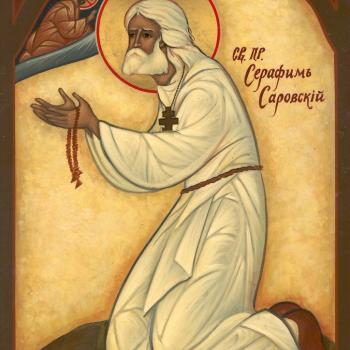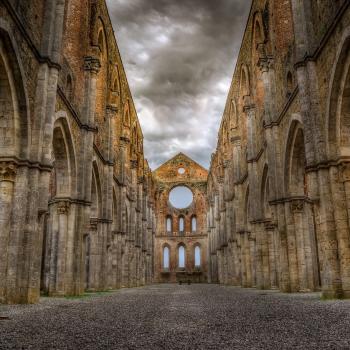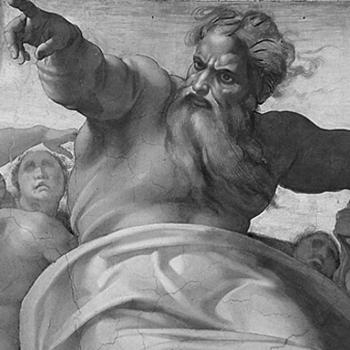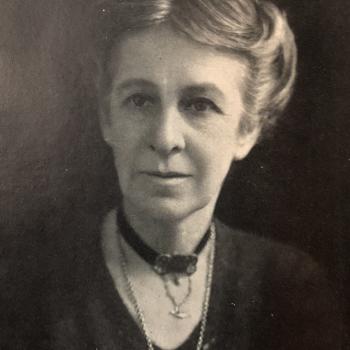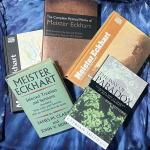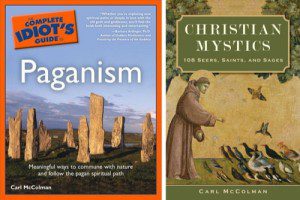
The late Kenneth Leech used to tell the story about giving a lecture at a seminary in America on the topic of race relations, and afterwards a seminarian seemed surprised to learn that he was the “same Kenneth Leech” who wrote books on spirituality. Apparently, the mind of this seminarian couldn’t equate a social-justice Christian with a contemplative-prayer Christian.
But yes, Leech-the-expert-on-racism and Leech-the-expert-on-mysticism were one and the same.
I often have a similar conversation with people who read my writing or attend one of my talks or retreats. These days, while I do some interfaith work, most of my writing and speaking is meant for Catholics or mainline Protestants. I write and speak about topics like Christian mysticism, contemplative prayer, monastic spirituality, and Celtic Christianity. But it doesn’t take a lot of digging on the Internet to discover that I didn’t always write or speak on these topics.
“Are you same Carl McColman who…?”
I know what’s coming when someone says, “When I heard you were going to lead our retreat, I googled you.” That usually leads to some variation of this question: “Are you the same Carl McColman who writes books about Paganism?”
The conversation generally goes like this:
“Well, it’s more accurate to say I used to write Pagan books — the last one was written in 2004 and published in 2005. I haven’t written books specifically for Pagan readers since, well, I left the Pagan world to become a Catholic.”
“So you used to be a Pagan.”
“That’s correct.”
“You were into Wicca, Druidism, shamanism, Goddess worship, all that stuff?”
“That’s correct.”
“But isn’t that stuff evil?”
“I think it’s dangerous to apply stereotypes to entire groups. Not all Christians are good, for example.”
Most people get this, and will acknowledge that money-grubbing TV preachers or clergy who abuse children are just two examples of Christians who undermine the integrity of our faith.
I go on. “You could say the same thing about Muslims, or Jews, or Buddhists. Remember the Buddhist who shot those people at the DC Navy Yard? Human nature being what it is, you find good and evil in all walks of life, all groups of people. So, yeah, there are some Pagans whose behavior I consider to be unethical, if not sinful or evil. But many other Pagans are dedicated to good things like building community or fostering environmental sustainability. So I think we need to avoid using simplistic labels.”
“Well, if it’s not evil, why did you leave Paganism?”
“After exploring Paganism for a number of years, I realized I didn’t belong there. My heart belongs to Jesus Christ. I made a mistake when I turned my back on him to pursue a spirituality that regarded him as just one among many spiritual teachers. By returning to Christianity and becoming a Catholic, I profess Jesus as the Second Person of the Holy Trinity, which is to say, a unique expression of God’s love.”
“What’s a nice Catholic like you doing in the interfaith world?”
Sometimes the conversation will focus not just on my Pagan past, but also my interfaith work, which has continued to the present day. “I saw online that you also do interfaith work.”
“That’s true. And out of that work, I remain deeply respectful of other faiths — all other faiths. Judaism and Buddhism, Hinduism and Islam, Wicca and Taoism, Sikhism and Shinto — as a Catholic Christian, it is my duty to be respectful of all religions, to respectfully criticize what I think is wrong or misguided but to just as respectfully affirm all that is good and true and beautiful. In every faith. And incidentally, the Catholic Catechism supports this perspective.”
“So let me get this straight. You wrote Pagan books, but you are no longer a Pagan. You realized Paganism wasn’t right for you, and that you love and follow Jesus Christ, but you don’t run around calling Paganism bad or evil because you believe it’s important to respect other religions, even minority religions like Paganism.”
“That’s correct. Mind you, I don’t believe ‘anything goes.’ I think it’s wrong to force women to wear birkas, or to practice animal sacrifice like in Santeria, or any other practice that is unjust, exploitative, or abusive. But to the extent that religions provide people with positive meaning, purpose, and ethical guidance, I believe as a Christian it’s my job to be in dialogue with such faith, not in hostile opposition.”
“Do you believe in the devil?”
“Evil is real. Just ask any slave, or abused child, or victim of trafficking or corruption. Whether ‘the devil’ is a sentient being or a mythical embodiment of evil, is, to my mind, irrelevant. We must fight evil either way. But I also think we need to be careful to avoid stereotyping groups of people as ‘good’ or ‘evil’ — instead we should simply oppose evil in whatever form it takes or whatever context it arises, and likewise we should support the good that can be found in whatever context or setting we find it.”
“Well, I have to admit, this all makes me uncomfortable.”
“I’m sorry if it bothers you that I wrote books about non-Christian spirituality over ten years ago, or that I remain committed to positive dialogue between faiths. My exploration of Paganism was a chapter in my life, and I’ve met many Catholics and other Christians who also explore other faiths, for a season or a decade. It’s something many people do. Nowadays, I only talk about Paganism or interfaith dialogue when I am asked to do so by the sponsors of my retreats or classes, and I always do so from the perspective of a committed follower of Jesus Christ. Even when doing interfaith work, I strive to keep my theology, ethics and beliefs well within what is generally accepted as orthodox Christianity. I myself have a spiritual director, a confessor, and numerous teachers and mentors within the Christian world.”
The Main Question
“As a Christian, why should I trust you?” This, really, is the main point behind conversations like this. It’s a great question, and perhaps one that readers should ask of all writers.
Here’s how I answer it:
“As to why you (or anyone) should trust me, what matters more to me is that you trust yourself. If you do that, then you can evaluate my work fairly. I believe that my current work speaks for itself. Read my blog. Read my books published since 2010. And when you attend my retreats or classes, listen to what I have to say with a discerning mind. Frankly, I think we should always practice discernment when listening to any teacher or speaker — even the ones we do trust! Even the best teachers make mistakes, and even the worst teachers come up with good ideas now and then.”
I always try to finish the conversation on a positive note.
“I know that not everyone is drawn to the topics I explore in my work: contemplative prayer, monastic spirituality, Christian mysticism, or Celtic wisdom — and, of course, interfaith dialogue. That’s fine. If this isn’t your cup of theological tea, then please find teachers more to your liking. But I hope you will be able to see that my intention is to promote authentically Christian, while interfaith-friendly, expressions of spirituality, mysticism, and wisdom.”
Generally, a conversation like this satisfies most people. Sometimes I run into people who are so genuinely frightened of interfaith dialogue, or of Paganism, that they simply cannot accept me, even now as a committed Christian. That saddens me, of course. But whenever possible, I like to talk to folks who are willing to hear about my spiritual journey. I love to share my experience: that a lively interest in the wisdom of other religious and philosophical paths, far from lessening my faith in Christ, helps me to become even more devoted to him. And I believe that can be true of anyone who approaches interfaith dialogue with a loving heart, a discerning mind, and a grounded commitment to your own faith.
To learn more about my spiritual journey from Paganism to Catholicism, read After the Magic, originally published on Beliefnet in 2005.
Enjoy reading this blog?
Click here to become a patron.





